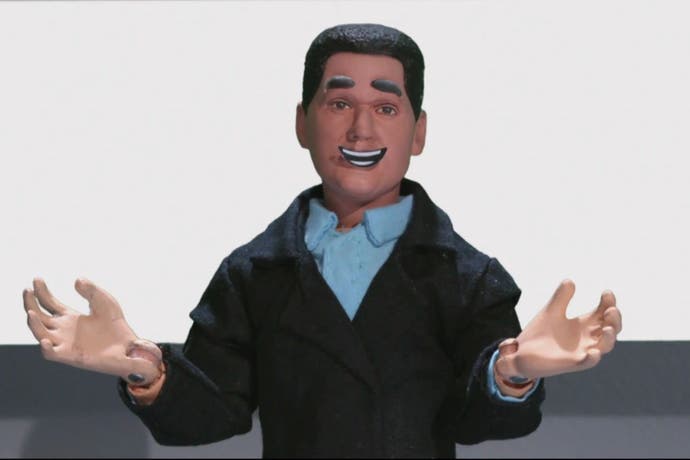Directly to you: Nintendo wins E3 on its own terms
New games, fresh thinking and brilliant PR bring the Kyoto giant bang up to date.
Reporting from last year's E3, I chided Nintendo for its deeply conservative line-up that traded on past glories. I felt that, despite their obvious quality, games like Super Mario 3D World and Mario Kart 8 showed a publisher and developer that was at risk of growing inward-looking and creatively stale. Seven months later, after a dismal round of financial results for the firm, I took up the theme again. Had the mighty Shigeru Miyamoto lost his touch? Where was the young talent that would replace him, and where were the killer new gameplay ideas the company was known for?
Waiting in the wings for E3 2014, it turned out. Nintendo has had a very good week. It has done more than answer critics like me that innovation still runs in its blood, and reassure fans like me that the next Zelda will be totally awesome. It has shown fussy old Nintendo starting to think and act like a 2014 video game company. It has addressed the gaming community directly in a way that made its rivals and their noisy live stage shows look old-fashioned and wasteful. Last year, Nintendo's retreat from the annual press conference popularity contest seemed like an admission of defeat. This year, it looked like tactical smarts and forward thinking. Nintendo has come bang up to date.
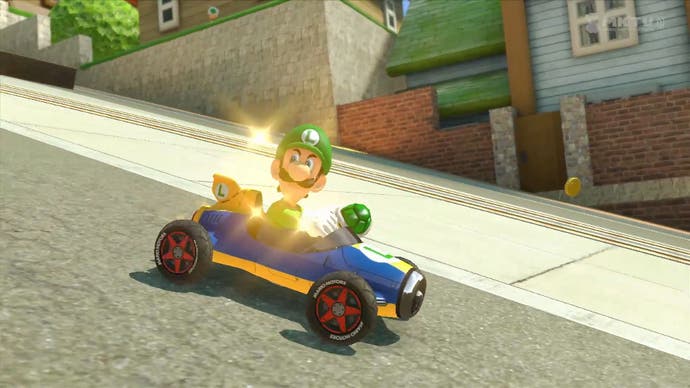
If Wii U's awful sales performance has Nintendo in panic mode, it certainly doesn't show it. Everything about its E3 showing has oozed confidence. Granted, that confidence will have been given a huge boost just before the show by the release of Mario Kart 8; president Satoru Iwata, had he been feeling well enough, could have surfed from Japan to California on the wave of buzz it generated.
On the surface, it looked like just another Mario Kart - albeit an exceptionally beautiful one - so I hope I can be forgiven for not spotting, a year ago, just how special this game was, and how important a release it would turn out to be for Nintendo. Not just a great online game - perhaps Nintendo's first truly great one - Mario Kart 8 is a game for the social media age, primed to go viral with its superb replay system and YouTube uploads. (And go viral is just what it did in this, the true year of Luigi.) It's deep yet approachable, old-school yet cutting-edge, it has purity yet it belongs to its players. It is a game that can look Dota 2 or Titanfall in the eye - and give them a patented Luigi Death Stare. It's a contemporary classic.
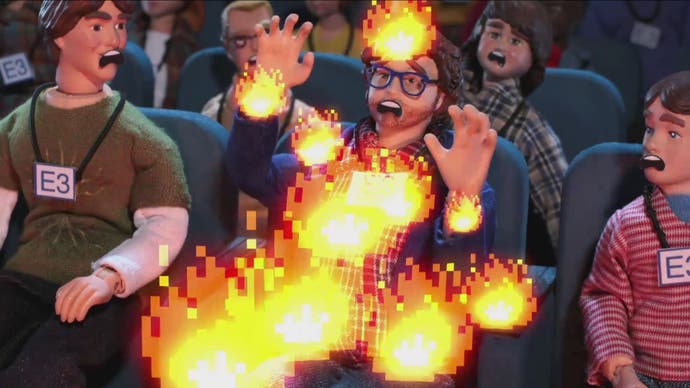
So Nintendo arrived in Los Angeles with a spring in its step. And then it did something you never expect Nintendo to do - get mean. Its E3 Digital Event was whimsical, yes, but also slickly produced, persuasive, even illuminating, and it took a firm step away from the gawky, homespun and humble tone of the Nintendo Directs. It began by characterising the old-style E3 press conference as a stop-motion farce and took a pot-shot at the cynical hacks and entitled fanboy bloggers Nintendo has spent decades being bullied by. "C'mon Reggie, give us Mother 3!" whined one before the Nintendo of America president set him on fire. It was silly, but the message was serious and clear: that was the old way of doing things, and now Nintendo would set its own agenda, thank you very much. You want a new Metroid? "Not my problem."
Of course, it would be a problem if there wasn't a little fan service in there somewhere. The Legend of Zelda producer Eiji Aonuma took care of that with a snap of his fingers, introducing next year's marquee Wii U game and saying everything that reasonably needs to be said about it in a single, electrifying image. It will be open-world and will aim to unpick some of the Zelda series' more hidebound conventions - although Aonuma framed this not as a bandwagon-chase, but as a return to the unfettered design of the earliest Zelda games. Regardless, it is clearly a game that can compete with, say, The Witcher 3 on sheer spectacle and scope, on juicy promise - and that's important. Like Mario Kart 8, it does not feel like a game made in a bubble.
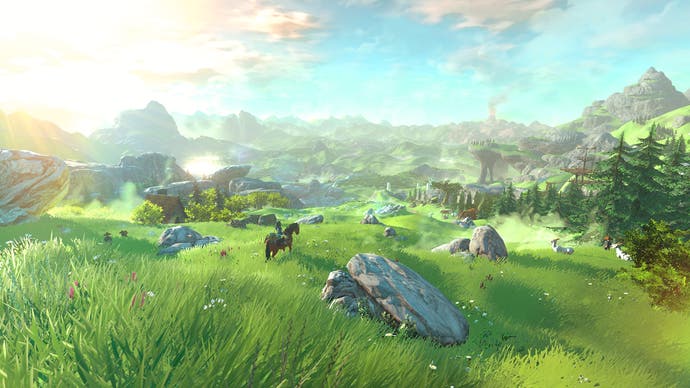
Then we were introduced to Splatoon, which seems custom-designed to answer every complaint I've been making about Nintendo of late. It's the brainchild of fresh, young talent within the company, it seems alert to the gaming zeitgeist, it operates outside of the EAD teams' comfort zone - in the world of online tactical shooters, no less - and yet it possesses a confident and distinctive Nintendo twist and an original design of great elegance and appeal. It's an all-new property, too; it could so easily have been Mario Paintball, but as the charming young developers explained in one of the informative Developer Story interviews, at Nintendo, gameplay comes first and you use the characters that fit. Mario can't turn into a purple squid.
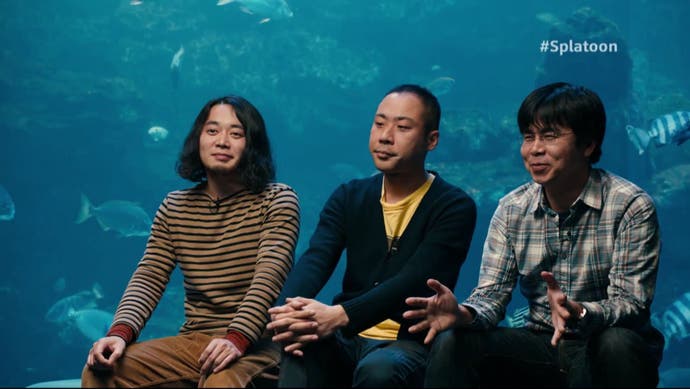
Splatoon is not something you can imagine Shigeru Miyamoto having come up with - and indeed, for me, the weakest element of Nintendo's showing was the legendary designer's prototypes for new Wii U GamePad games. I'm glad Martin was entertained and enthused by them on the show floor, but like the original Wii U prototypes, they seem destined to end up in another mini-game compilation, while Miyamoto's quest to wrestle a single powerfully compelling gameplay idea out of the weird gadget looks increasingly quixotic. It's a wonderful system interface for Wii U, and I'm sure Splatoon and Zelda and all the others will find some benefit from its second screen, but like Super Mario 3D World and Mario Kart 8, they could just as easily exist without it. It was telling that the Digital Event didn't mention Miyamoto's sketches - in fact, unthinkably, Miyamoto didn't appear in it at all - or otherwise spend time trying to justify the GamePad's existence. There were the new Amiibo figurines, an obvious fit for this erstwhile toy company, but otherwise Nintendo's focus now seems firmly on software innovation first, hardware innovation second, which I think is healthy.
Speaking of which, separately from the Digital Event, Nintendo unveiled a 3DS title called Code Name STEAM, a new steampunk strategy game from Intelligent Systems. The Nintendo of a few years ago would have commissioned yet another Fire Emblem or Advance Wars from these tactical masters - and who among us would have complained about that? - yet here was another original title, drawing inspiration from such unlikely sources as HP Lovecraft, Jack Kirby and (by the look of it) XCOM. All the signs point to a diverse creative team being given the freedom to run with their ideas and express Nintendo's values in a fresh milieu. Again, just what I wanted to see.
No coyness, a minimum of hype, just raw information and enthusiasm... Was this really E3?
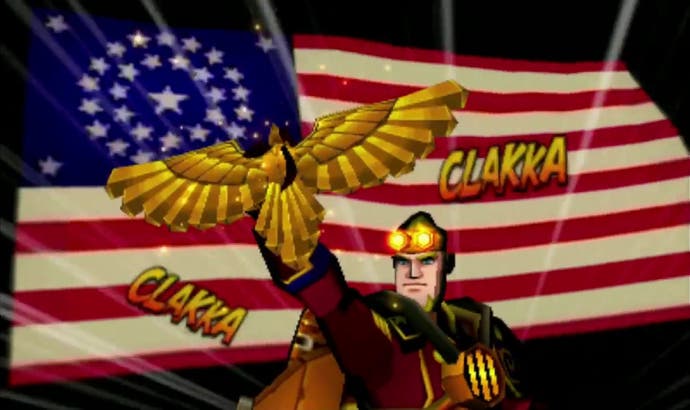
The best part of all, though? It didn't stop with the game announcements. After the Digital Event, Nintendo's E3 continued online with its Treehouse live streams and best-in-class YouTube presence. There was a live-streamed Smash Bros eSports tournament, something you would sooner expect of a company like Valve or Blizzard. There were developer presentations with reams of live gameplay that were considerably more lengthy and detailed than the "behind-closed-doors" demos we journos are accustomed to at E3. I strongly recommend checking them out. No coyness, a minimum of hype, just raw information and enthusiasm transmitted direct from the developers to the players, without the publicists, the marketers - or even us journalists - getting in the way. Was this really E3?
I mentioned Blizzard. As a fan of both developers, I'm fond of drawing comparisons between Blizzard and Nintendo, even though they make very different kinds of games: they share a commitment to extreme levels of polish, they both put design before technology, and they both exhibit a vibrant tactility in their visual and audio design. But I would never have compared their PR strategies before now. Yet Nintendo at E3 2014 reminded me of nothing so much as Blizzard at its yearly BlizzCon show: ignoring the competition, inviting the media to join in yet respectfully setting them to one side, opening a direct channel to its community and then diving in deep on the games. Nintendo's communications strategy is now more comparable to those of leading PC game developers than those of its console competitors - and for my money, that makes it more relevant and progressive, too. What a turn up for the books!
Will all this "save" Wii U from its ignominious sales? Probably not. Does it matter? Not in the long term. What matters is that it saves Nintendo. In my decade as a games journalist, and during many preceding years as an amateur industry-watcher, I've had a consistent watchword: never write off Nintendo. The Kyoto company is tenacious, inventive, wealthy enough to weather a long storm, and it just loves making games. After E3 2014, I'm not going to be changing my stance.
